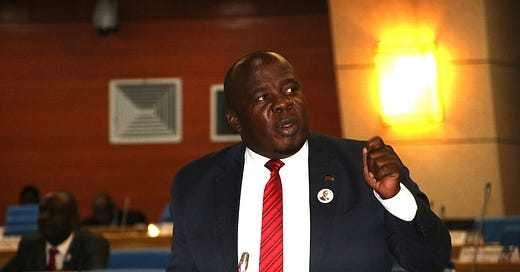Heat and Drama in Malawi Parliament Over Currency Devaluation
The devaluation of the kwacha last week has sparked public panic and outrage as the cost of living is expected to skyrocket.
LILONGWE, Malawi - Malawi's parliament descended into heated debate and drama on Monday as opposition lawmakers demanded an urgent statement on the country's controversial 44% currency devaluation before proceeding with other business, writes Winston Mwale.
The devaluation of the kwacha last week has sparked public panic and outrage as the cost of living is expected to skyrocket.
Opposition leader Kondwani Nankhumwa asserted that Minister of Finance and Economic Affairs Simplex Chithyola should have first explained the move to parliament before MPs tackle the scheduled mid-term budget review.
"The devaluation has caused a lot of suffering among Malawians. As their representatives, we need answers," Nankhumwa declared.
However, the leader of the house, Richard Chimwendo Banda, stated that parliamentary standing orders require advance notice for such ministerial statements.
He said Chithyola was prepared to deliver a comprehensive report on Tuesday if proper procedures are followed.
Speaker Catherine Gotani Hara ultimately ruled in favour of the government, refusing to allow an immediate devaluation discussion but agreeing to add it to the next day's agenda.
This sparked loud protests from opposition benches.
After sometime, calmer heads prevailed and parliament proceeded with scheduled business - a debate on maize availability.
But tensions remained high throughout the session.
Agriculture Minister Sam Kawale's assurances that government was procuring maize and appealing to donors did little to mollify the impassioned opposition.
MPs claimed their constituencies had received no maize for months.
Kawale admitted distribution problems but argued adequate funding could solve them.
However, cries of "Lies!" and "Shame!" from the opposition benches punctuated his remarks.
The volatile session underscored growing frustration with President Lazarus Chakwera's administration and its economic policies.
Political analysts described the raucous scenes as further evidence of a "dysfunctional" parliament plagued by partisan divisions.
The Malawian kwacha lost over 40% of its dollar value overnight due to the dramatic devaluation by the Reserve Bank of Malawi (RBM) last week.
The sudden move surprised citizens and local businesses alike.
The central bank hopes devaluation will ease forex shortages and stabilize prices.
However, opposition leaders and trade unions blasted the decision as poorly timed and communicated.
They argue devaluation will heap more misery on households already struggling with high inflation and unemployment.
The Consumer Association of Malawi warned prices of imported goods could rise 50-70% by December, further squeezing struggling consumers.
Energy prices have also increased substantially.
President Chakwera swept into office in 2020 vowing to create one million jobs, build infrastructure and empower marginalized groups.
But his ambitious agenda has stumbled amid economic woes, partisan gridlock and corruption scandals.
Devaluation could further setback Chakwera's agenda by squeezing household incomes and construction projects.
Economic uncertainty may also deter investment and entrepreneurship.
Rising kwacha instability and forex shortages have impacted fuel supplies, industrial inputs and food imports.
The situation threatens to worsen following last week's huge devaluation.
With the IMF expected to demand more reforms, additional austerity measures also loom.
The Fund's head of mission makes his first visit to Malawi this week since the restored Extended Credit Facility program.
On the streets of Lilongwe, Blantyre and other cities, ordinary Malawians have expressed anger, fear and frustration over rising living costs.
With national elections just 18 months away, citizens will be expecting substantial relief measures in the coming budget. But analysts say fiscal constraints may prevent significantpublic spending.
IN SUMMARY
- Malawi's parliament erupted in heated drama on Monday over government's surprise currency devaluation.
- Opposition lawmakers demanded the finance minister explain the controversial 44% kwacha devaluation before other business proceeded.
- But the house speaker rejected allowing an immediate devaluation discussion, sparking uproar and temporary suspension of parliament.
- The tense scenes underscored partisan divisions and growing public frustrations with economic hardship under President Lazarus Chakwera.
- Devaluation aims to ease forex shortages but will likely worsen inflation, squeeze household incomes and jeopardize Chakwera's policy agenda.
- Providing social protections and economic relief will prove challenging given IMF austerity calls and meager government resources.
- Citizens already bearing the brunt of rising prices expressed anger and uncertainty over their future livelihoods.
- With elections pending, government faces mounting pressure to cushion vulnerable groups and reboot the economy.




